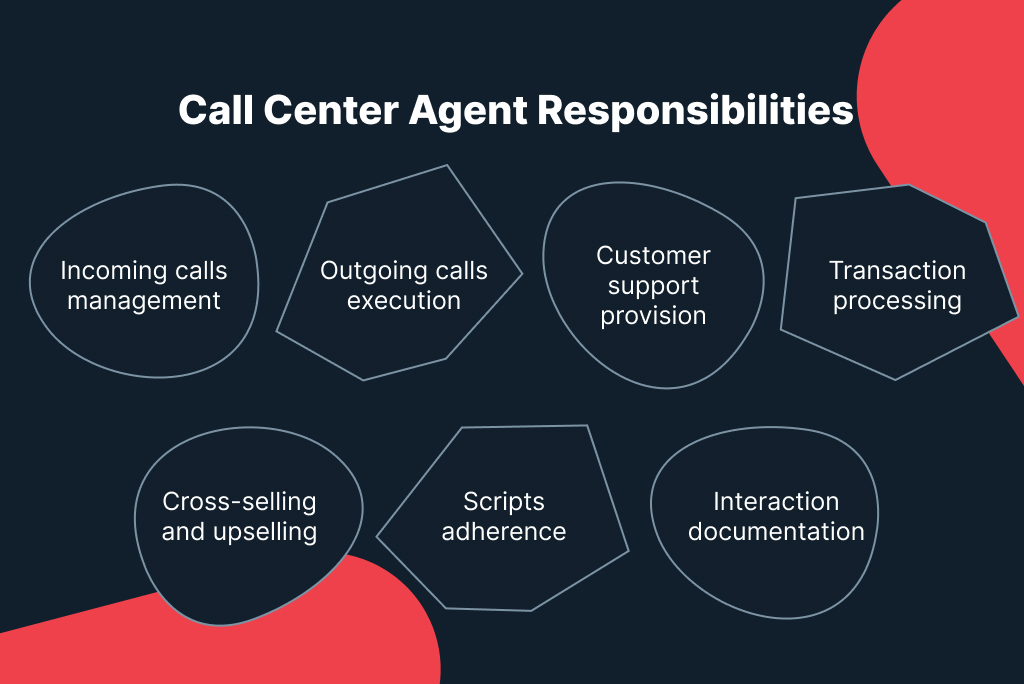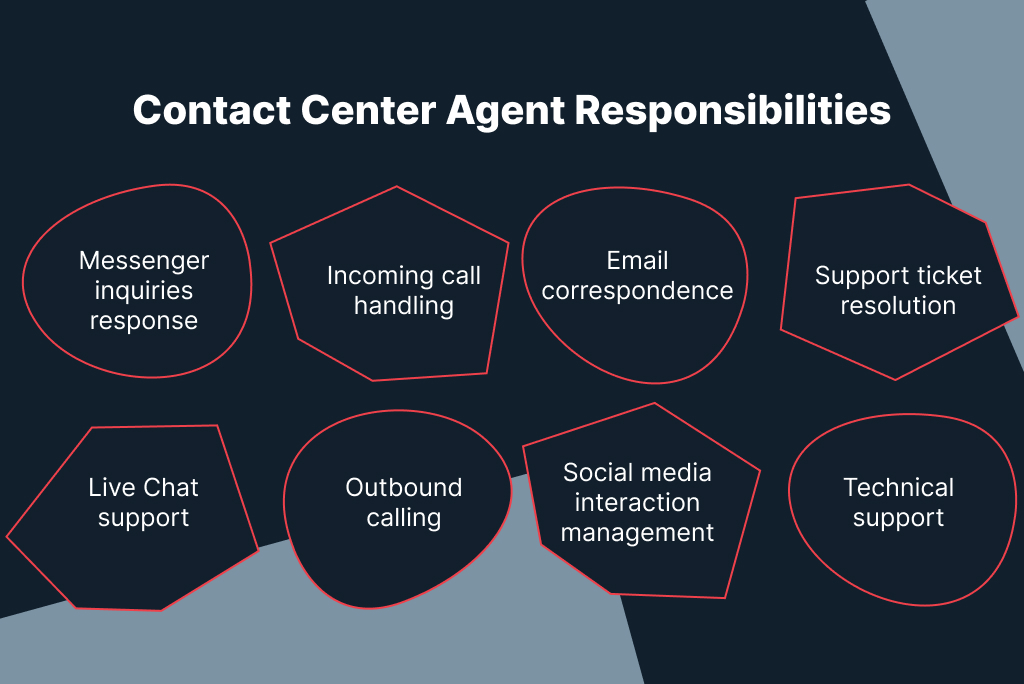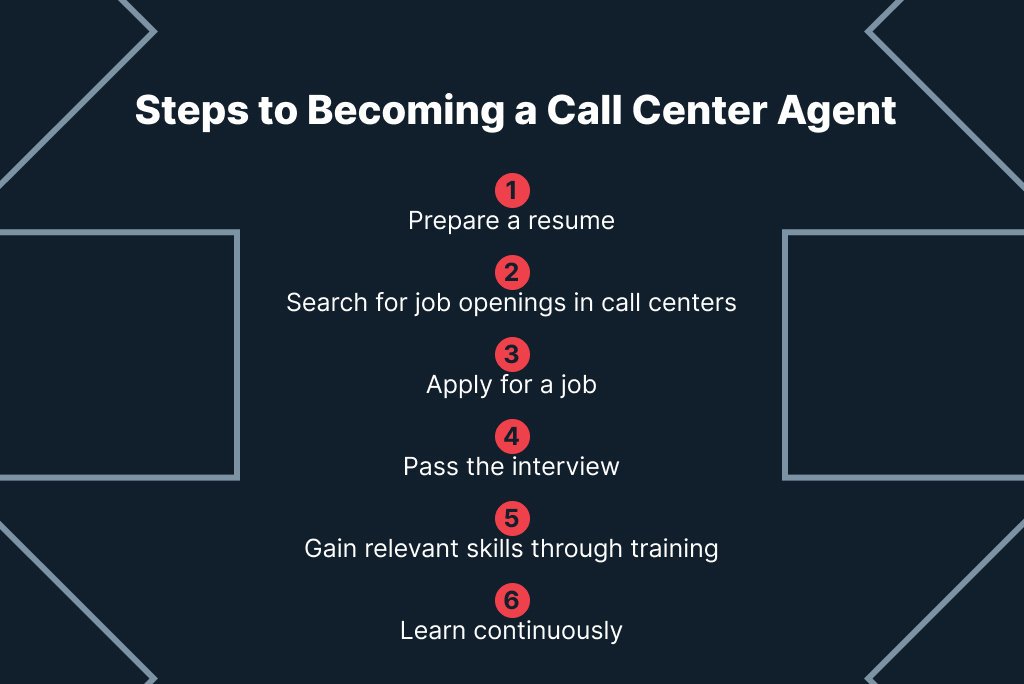
How To Become A Call Center Agent: An All-Inclusive Guide
A call center serves as the hub where agents address customer queries and provide round-the-clock support. However, working in a call center is no easy task! It demands high flexibility, adaptability, and a range of essential soft skills.
Call center agents must strike a balance between their organization's needs and ensuring customer satisfaction. Each customer presents unique complaints, attitudes, and concerns, making the job demanding and complex.
Furthermore, the performance of call center representatives directly impacts the company's revenue and reputation.
Are you interested in joining a call center? Wondering what is call center agent and how to become a call center agent? Curious about the skills you need to acquire or the tasks you'll be handling?
This article is here to guide you. We will explore what it takes to become a successful call center agent, discuss their roles and responsibilities, and outline the necessary call center requirements and call center qualifications. Additionally, we'll compare call center agents to contact center agents, highlighting the differences between these pivotal customer service roles.
Stay with us as we delve into everything you've been curious about!

What Is Call Center Agent?
A call center agent is an individual responsible for handling incoming and outgoing customer calls for a business. They are the front line of customer service, tasked with solving problems, providing information, answering inquiries, and sometimes selling products or services over the phone.
This role is increasingly vital as businesses strive to enhance customer satisfaction and loyalty. But in today's fast-paced and digitally connected world, the expectations from a call center agent are evolving.
Agents are now expected to manage a broader range of customer interactions beyond voice calls, marking a shift towards the more inclusive and dynamic role of a contact center agent.
Who Is A Contact Center Agent?
A contact center agent represents the next evolution in customer service, offering omnichannel customer support to meet the modern consumer's expectations.
Unlike traditional call center agents who communicate primarily via telephone, contact center agents use a variety of channels to interact with customers. This includes email, live chat, social media, messengers, and sometimes even video calls, providing a seamless customer experience across all platforms.
The role of a contact center agent is to ensure that every customer receives prompt, efficient, and effective service, regardless of the communication channel they choose. By embracing omnichannel customer support, agents can offer a more flexible, responsive, and personalized service, catering to the evolving needs of today's digital consumers.
What Does A Call Center Agent Do?
Call center agents are pivotal in managing customer interactions, primarily through voice communication. They work within a call center environment, focusing on delivering high-quality customer service and support. Their responsibilities are tailored to ensure customer satisfaction and to address various customer needs over the phone.

Call center agents have diverse responsibilities and duties, including:
- Handling incoming calls: Their main responsibility is to answer incoming calls from customers, address their questions, resolve issues, and provide information about products or services.
- Making outbound calls: Agents also conduct outbound calls for various purposes, such as follow-ups on inquiries, customer satisfaction surveys, or to inform customers about new offers and services.
- Providing customer support: They offer solutions to customer problems, guide them through troubleshooting processes, and answer any questions regarding the company's services or products.
- Processing transactions: Call center agents may process orders, payments, or changes to customer accounts, ensuring accuracy and efficiency.
- Cross-selling and upselling: When appropriate, agents might suggest additional products or services to customers, enhancing their experience and contributing to the company's revenue.
- Following scripts: Agents often follow call scripts to ensure consistency in customer service and compliance with company policies. However, they must also be able to adapt their communication style as needed to address the customer's specific concerns.
- Documenting interactions: They keep records of customer interactions, transactions, and feedback, which are crucial for service improvement and resolving future inquiries.
In summary, call center agents handle a variety of call center needs and issues, including customer complaints, inbound and outbound sales, pre-sales, payment management, account inquiries, upgrades or closures, appointment booking, and more.
It is crucial for call center agents to possess the necessary qualifications and skills to ensure a seamless customer experience and avoid any potential obstacles along the way.
What Does A Contact Center Agent Do?
Contact center agents represent the move towards a more integrated and accessible approach to customer support, where interactions extend beyond voice calls to include digital platforms. This flexibility enables them to reach customers through various channels, from social media to email, creating a thorough support system that meets the digital age's requirements.

Let's explore the diverse responsibilities that characterize the daily tasks of a contact center agent:
- Responding to customers' messenger inquiries: A primary responsibility is to quickly address inquiries received through various messaging platforms, ensuring comprehensive and satisfactory responses to all customer concerns.
- Handling incoming phone calls: They are equipped with the necessary tools and training to efficiently address customer needs over the phone.
- Answering emails: They also manage email communications, responding to customer inquiries and requests to provide detailed and helpful information.
- Responding to support tickets: Contact center agents apply their skills and knowledge to address and resolve issues submitted through web forms, focusing on delivering effective solutions and maintaining customer loyalty.
- Engaging in live chats: Contact center agents conduct live chat sessions, providing instant support and addressing customer needs in real-time.
- Making outbound calls: They also perform outbound calls for various purposes, including lead generation, sales, customer feedback surveys, and promotional announcements.
- Managing social media interactions: Agents monitor and respond to customer inquiries and comments on social media platforms, ensuring a positive brand presence and timely customer support.
- Offering technical support: For businesses that require it, agents are trained to provide technical assistance, guiding customers through troubleshooting steps or resolving technical issues directly.
In essence, the role of a contact center agent is pivotal in delivering omnichannel customer support, ensuring a cohesive and satisfying experience across phone, email, live chat, social media, and more. Their ability to adapt and respond across these channels is fundamental to meeting the modern customer's expectations for accessible, responsive, and personalized service.
Requirements And Qualifications For Call Center Jobs
Call center agents are expected to possess exceptional soft skills to provide the best service possible. Additionally, they may also require industry-specific or corporate expertise.
In certain sectors like banking and insurance, prior education or training can be advantageous for call center representatives to gain a deeper understanding of the business they serve.
Furthermore, there are instances where on-the-job training, either before or after the hiring process, may be necessary to ensure agents are fully equipped for their roles. Just as in Simply Contact, where comprehensive on-the-job training is provided to ensure that every agent is thoroughly prepared for their specific duties.
Here is a list of call center qualifications and call center requirements needed to apply for a call center agent:
- Degree-level qualification (preferred but not required).
- Prior experience in customer service, sales, or a related field is highly valued. For companies like ours, which offer services across various industries, relevant experience in the specific sector (e.g., tech support, retail, aviation, traveling) can be a significant advantage.
- Strong written and verbal communication skills, as well as interpersonal skills, are crucial. Agents must be able to convey information clearly and effectively, ensuring customer understanding and satisfaction.
- For roles requiring support in multiple languages, proficiency in those languages is a significant advantage. For instance, Simply Contact often requires an Upper-intermediate (B2) level or above in English, German, or other relevant languages.
- Empathy, sociability, responsibility, a growth mindset, and a results-oriented approach are foundational attributes for a call center agents in Simply Contact.
These call center qualifications are designed to ensure that customer support specialists can meet the evolving needs of customers, providing support that is not only responsive but also empathetic and informed. Simply Contact values these skills highly, as they directly contribute to customer satisfaction and loyalty.
How To Become A Call Center Agent
Entering the call center industry is accessible to those with strong communication skills and a customer service orientation. While educational backgrounds can vary, the emphasis is on practical experience and the ability to engage effectively with customers.
Here are the steps to start your career as a call center agent:

1. Prepare a resume
Craft a comprehensive resume that highlights your relevant skills and experiences for a call center role. Previous experience in customer service-related fields such as food service, retail, or sales can be an excellent starting point for your job search.
2. Search for job openings in call centers
Look for call center vacancies that match your skills and interests. Pay attention to job descriptions that align with your experience and highlight these in your applications.
3. Apply for a call center jobs
Consider the type of call center you would like to work in. There are opportunities in both the private and public sectors, each offering different compensation levels and potential for career growth.
If you're interested in joining Simply Contact, you can find more detailed information about current job openings and the application process here.
4. Pass the interview
Once you've applied for a job and embarked on a call center career path, recruiters may reach out to you for an interview. Interviews are typically conducted in three common formats: over the phone, online, or in person.
An interview is a valuable opportunity for your prospective employer to get to know you personally and gain insight into your professional expertise and educational background.
To ensure a successful interview, it is crucial to come prepared. Dress appropriately, bring a copy of your CV, and arrive on time to make a positive impression.
5. Gain relevant skills through training
At Simply Contact, once you've successfully passed the interview and been hired, you'll undergo comprehensive training before starting work on the specific project. This internal training is a crucial part of our onboarding process, designed to equip you with the knowledge and tools needed for success on the project.
Our approach ensures that all agents are well-prepared, and understand the intricacies of the project they will be working on, from technical skills to customer interaction techniques.
6. Continuously enhance your skills
The call center field is dynamic, with new technologies and customer service practices continually emerging. Engage in ongoing learning opportunities, such as workshops, webinars, and certification courses, to stay ahead in the industry.
This commitment to professional development can lead to career advancement, higher compensation, and the ability to take on more complex roles within the organization.
By taking these steps and focusing on growth and learning, you can have a rewarding career as a call center agent. The journey from applying to becoming a seasoned professional is enriched by each learning opportunity and challenges faced along the way, preparing you to excel in the dynamic world of customer service.

Summary
The success of call centers is undeniably influenced by the performance of their representatives. The skills and attitude of these representatives play a crucial role in winning, satisfying, and retaining customers. To excel in this role, it is essential for call center agents to be highly professional and possess the necessary qualities expected from a call center representative.
This article provides valuable insights on how to become a successful call center agent. By reading it thoroughly, you can gain confidence and knowledge to embark on a career in this profession.
If you have any questions or require further assistance, feel free to reach out to us. We are dedicated to helping your call center achieve great heights of success.
Get fast answers to any remaining questions
Thank you.
Your request has been sent successfully.
Your request has been sent successfully.





